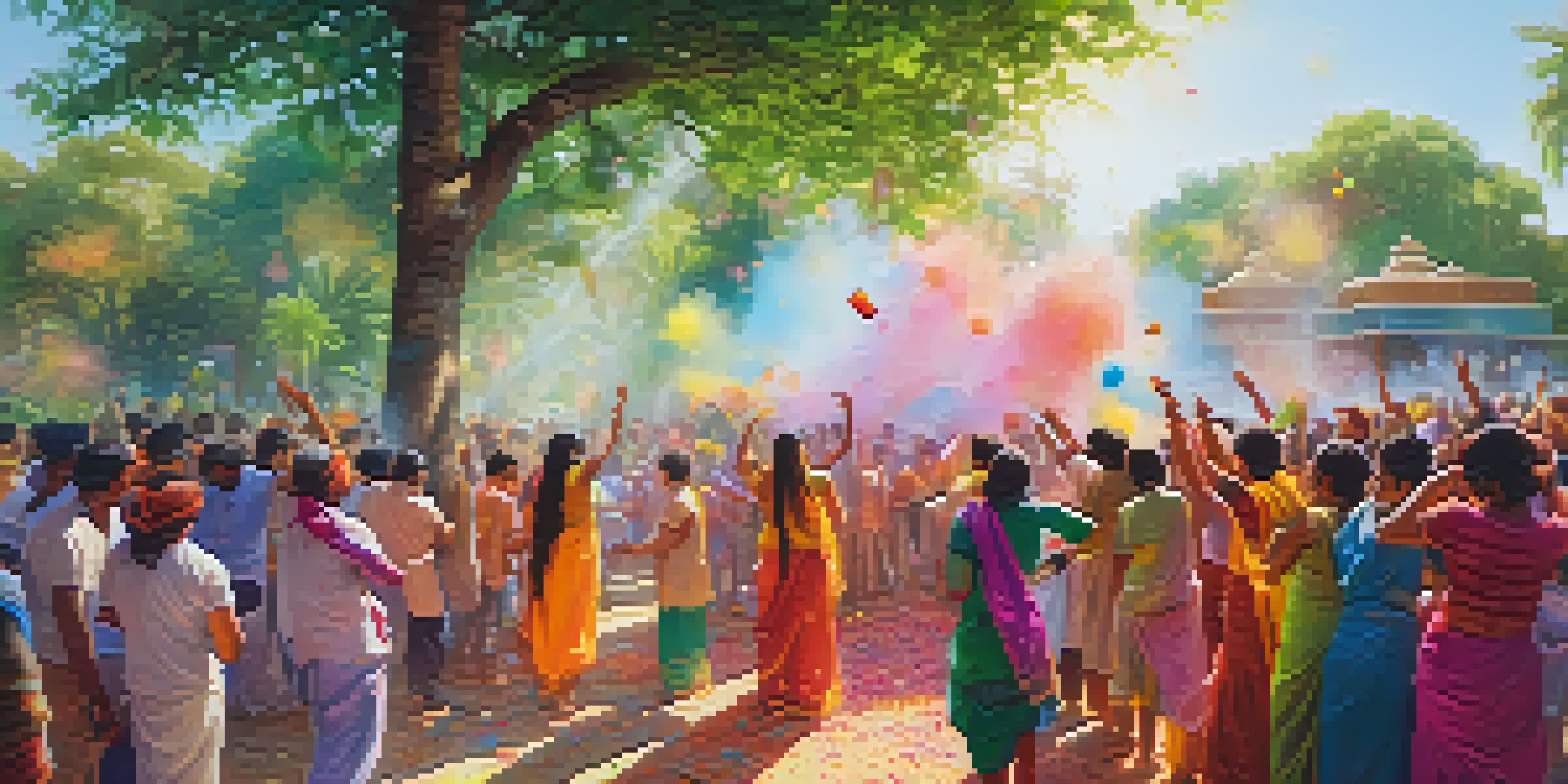Marijuana in Hinduism: Sacred Texts and Practices

Marijuana's Historical Context in Hinduism
Marijuana, known as 'bhang' in India, has a deep-rooted history in Hindu culture. Its use can be traced back thousands of years, often linked to rituals and spiritual practices. The plant has been revered not just for its psychoactive properties but also for its medicinal benefits, highlighting its multifaceted role in ancient society.
The use of cannabis in spiritual practice is not just about the substance itself; it's about the intention and the sacred connection it fosters.
In the Vedic texts, which are some of the oldest scriptures in Hinduism, there are references to various plants and herbs used for spiritual enlightenment and healing. Marijuana is often associated with Lord Shiva, who is depicted as a consumer of bhang, symbolizing its sacred status. This connection has woven marijuana into the fabric of many Hindu festivals and practices.
The historical context of marijuana in Hinduism showcases its importance beyond mere recreation. It has served as a tool for meditation and a means to connect with the divine, illustrating how sacred practices have evolved over time while retaining their spiritual significance.
The Significance of Bhang in Hindu Festivals
Bhang plays a vital role in various Hindu festivals, particularly during Holi, the festival of colors. During this celebration, bhang is consumed in the form of drinks or sweets, symbolizing the joy and exuberance of the festival. This practice not only enhances the festive spirit but also strengthens communal bonds among participants.

Another significant occasion for bhang consumption is Maha Shivaratri, dedicated to Lord Shiva. Devotees often consume bhang as a form of offering, believing it brings them closer to the deity. This ritual underscores the deep spiritual connection many Hindus feel towards marijuana as a sacramental substance.
Marijuana's Sacred Role in Hinduism
Marijuana, or bhang, is deeply intertwined with Hindu rituals and spiritual practices, symbolizing its sacred status within the culture.
Through these festivals, marijuana transcends its commonplace image and becomes a medium of spiritual expression. By embracing bhang, devotees celebrate their faith, marking the plant as sacred and integral to their religious practices.
Sacred Texts Referencing Marijuana in Hinduism
The use of marijuana is mentioned in several sacred Hindu texts, including the Atharva Veda. This ancient scripture categorizes bhang among the five sacred plants, highlighting its importance in spiritual and medicinal contexts. Such references affirm the plant's revered status within the broader spectrum of Hindu beliefs.
Marijuana can serve as a bridge to deeper understanding, allowing us to explore the realms of consciousness and spirituality.
In addition to the Vedas, texts like the Manusmriti also discuss the use of intoxicants, including bhang, within the framework of moderation and spiritual growth. These texts often emphasize the importance of intention behind consumption, suggesting that marijuana should be used wisely and respectfully.
The sacred texts serve as a guide for followers, illustrating that marijuana's role is not merely recreational but deeply intertwined with spiritual practices. This sacred context adds layers of meaning to marijuana, reinforcing its significance in the lives of many Hindus.
Marijuana as a Tool for Meditation and Spiritual Insight
For many practitioners, marijuana is seen as a catalyst for meditation and deeper spiritual insight. Consuming bhang can help individuals reach altered states of consciousness, making it easier to connect with their inner selves and the divine. This transformative experience is often described as a journey towards enlightenment.
The calming effects of marijuana can also aid in focusing the mind, allowing for prolonged periods of meditation. By alleviating distractions, it encourages practitioners to delve deeper into their spiritual practices. This has led to a growing acceptance of marijuana as a legitimate tool for enhancing one's spiritual journey.
Bhang's Importance in Hindu Festivals
Bhang is commonly consumed during festivals like Holi and Maha Shivaratri, enhancing communal bonds and spiritual connections among devotees.
Through this lens, marijuana transcends its physical properties and becomes a sacred ally in the quest for understanding and connection. This perspective resonates with many modern practitioners who seek to integrate traditional practices into their contemporary spiritual routines.
Cultural Perceptions of Marijuana in Hindu Society
While marijuana holds a sacred place in Hinduism, cultural perceptions can vary widely. In some circles, bhang is celebrated as a time-honored tradition, whereas in others, it faces stigma due to its association with recreational drug use. This duality reflects the broader societal attitudes towards cannabis in many parts of the world.
Despite these differing views, there is a growing movement advocating for the recognition of marijuana's cultural and spiritual significance. Many enthusiasts argue that understanding bhang's historical context can help reshape perceptions, encouraging a more nuanced discussion around its place in society.
As conversations around marijuana evolve globally, Hindu society is also navigating its complex legacy. By embracing its cultural roots, many hope to foster a more informed dialogue about the benefits and implications of marijuana use within their communities.
The Modern Revival of Marijuana Practices in Hinduism
In recent years, there has been a revival of interest in traditional marijuana practices within Hinduism. This resurgence is often seen in the context of a broader cultural renaissance, where individuals seek to reconnect with their roots and reclaim ancient wisdom. Many practitioners are exploring the spiritual dimensions of marijuana use, integrating it into their daily rituals.
Workshops, retreats, and festivals centered around bhang are becoming more common, allowing people to engage with the plant in a respectful and educated manner. These gatherings often emphasize the importance of intention, community, and spirituality, creating a space for holistic exploration and understanding.
Modern Revival of Marijuana Practices
A resurgence of interest in traditional marijuana practices is emerging in Hinduism, fostering community and encouraging respectful exploration of its spiritual dimensions.
This modern revival not only honors the historical significance of marijuana in Hinduism but also fosters a sense of community among practitioners. It encourages an open dialogue about spirituality, wellness, and the sacred, ensuring that these ancient practices continue to thrive in contemporary society.
Legal and Ethical Considerations Surrounding Marijuana Use
As interest in marijuana grows, legal and ethical considerations are becoming increasingly important. In India, while bhang is traditionally accepted, cannabis laws can be complex and vary from state to state. This legal landscape presents challenges for practitioners who wish to incorporate marijuana into their spiritual practices.
Ethically, the conversation around marijuana often involves discussions about responsible use and respect for its cultural significance. Many advocates emphasize the need for education and awareness, suggesting that responsible consumption aligns with the respectful practice of Hindu traditions.

Navigating these legal and ethical waters requires a careful balance between honoring tradition and adhering to contemporary laws. By fostering a responsible and informed approach, practitioners can continue to explore the sacred dimensions of marijuana while respecting the broader societal context.